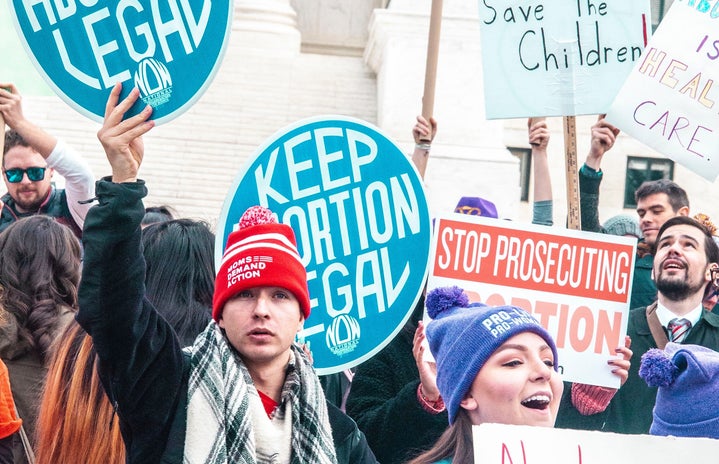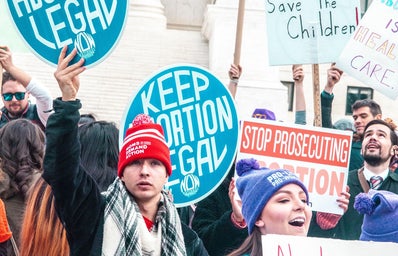Cw: revokement of reproductive rights
Millions of US citizens were shocked but not surprised by the leaked majority draft of US Supreme Court Justice Alito’s opinion that aims to overturn Roe v. Wade.
Roe v. Wade is a decision that the Supreme Court made in 1973 that ruled the US Constitution protects a woman’s right to reproductive privacy, including the right to choose whether or not to have an abortion without the presence of severe government regulation. Alito argued that “the Constitution makes no reference to abortion, and no such right is implicitly protected by any constitutional provision.“ He also stated that any right to abortion is not “deeply rooted in this country’s history.” While abortion rights have been protected for the past 49 years, the United States has a long and unfortunate history of oppressing women. So while recent history does support reproductive freedom, the preceding centuries do not. Alito’s argument is flawed for many reasons, including its implication that simply because something has remained constant throughout history it shall not change. As a society, we should learn from history, in order to prevent history from repeating itself.
In large part, the overturning of Roe v. Wade is made less complicated for conservative justices due to the ruling’s legal status. Since the decision was never formally codified into the US legal system, it does not have a legitimate standing. After the ruling was decided in 1973, it never went through the codifying process, and ever since President Bill Clinton’s term, Democrats have made excuses for not doing so.
Those with pro-life beliefs have been fighting to overturn Roe v. Wade since its federal legalization of abortion in 1973. Even among blue voters themselves, there were not enough people who held pro-choice beliefs in order for democratic Presidents to codify it and “risk losing votes.” There was also a sense that passing reproductive rights into law was not necessary, and thus no one took action. Before President Barack Obama was elected, he stated he would codify Roe v. Wade if and when he was elected into office. However, after only 100 days of his presidency, he vaguely announced that he was in no rush to codify it and had more important matters to attend to, after being asked about his plans during a press conference. By not going through the codifying process, Roe v. Wade is at risk of being overturned by a majority conservative Supreme Court, like the one we have right now.
If Roe v. Wade is overturned, it will not only impact female reproductive health and patient-physician trust; it will disproportionately affect women of colour, lower socioeconomic status, and those in conservative regions.
The following situations are relevant if Roe v. Wade is overturned:
In many conservative states, there are abortion bans/restrictions waiting to be enacted as soon as Roe v. Wade is overturned. A large amount of these restrictions will prohibit abortion even if the mother’s health and/or life is at risk. This is a clear cause for concern as this sentiment completely disregards mothers’ needs and prevents healthcare systems from properly doing their jobs. Additionally, if patients confide in providers that they have undergone an emergency abortion, and if providers fear their license being revoked, they may break patient-clinician confidentiality and call police on their patient. This creates greater mistrust in the healthcare system and will be even more detrimental to women’s reproductive health.
If women of colour attempt to terminate a pregnancy in states where abortion will be planned, they face jail time, further increasing the disproportionately high numbers of black inmates in our country. US prisoners already make up roughly 20% of prisoners worldwide, while the US population only makes up about 4.25% of the global population. Incarceration in this country is out of control, and criminalizing abortion will only increase the number of people behind bars in already-over-flowing prisons nationwide.
People of lower socioeconomic status will have the hardest time seeking and receiving an abortion, especially if they reside in a conservative state. For one, they won’t have access to a private physician who may perform an abortion in secret, as wealthy women may have. Additionally, traveling to another state for an abortion is costly and not an option for many. It also may not be feasible for one to move to a blue state, away from family and certain jobs. And finally, there is always the cost of the procedure itself to consider, which will be very expensive without insurance; a privilege that some economically disadvantaged people may not have.
Even if Roe v. Wade is overturned and abortion is banned in certain states, privileged people will always have access to abortion. Who does this privileged category typically consist of? Wealthy white women. The partners of politicians, including conservative politicians, will be able to have an abortion. It does not seem fair that the same people making laws about reproductive rights are exempt from those very laws.
Another thought to consider: if anyone who currently supports the overturning of Roe v. Wade plays the religion card, and says they’re Christian, shouldn’t that argument be invalid for citizens who are part of other religions and hold different beliefs? Church and state should remain separate and it is dangerous to cross the two.
They don’t care about children’s well-being. They certainly don’t care about the future of black and brown children. This is about social control. Foster care in most states is corrupt and doesn’t meet children’s needs. Systemic racism remains very prevalent in American society, with everything from education to housing in certain neighbourhoods.
Why are people without uteruses creating laws that regulate those with one?
Personally, I am tired of the systematic oppression that pervades every aspect of society; as American as a Sunday baseball game.
America is embarrassing. As a country, we need to practice empathy for everyone’s unique situation and refrain from continuously passing laws that take away personal liberties.


